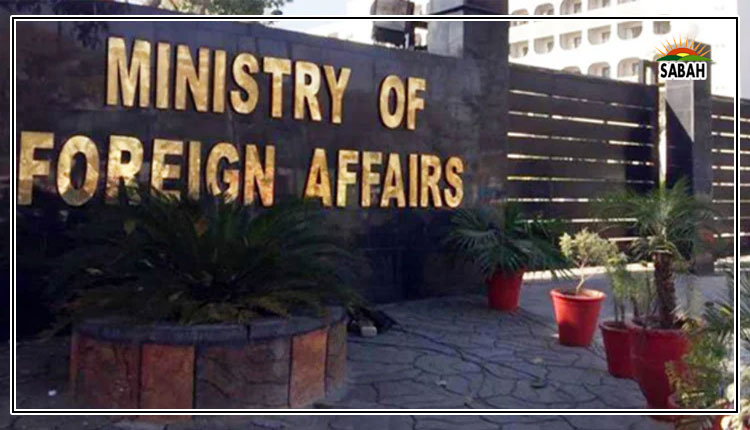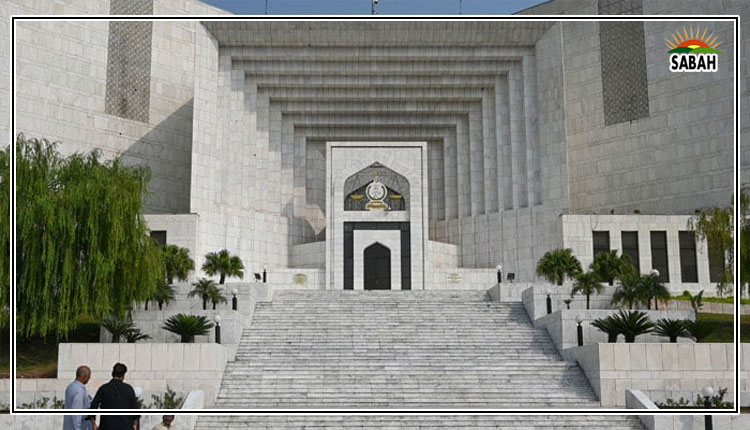SC’s constitutional bench issues notices to three judges, others on pleas against IHC seniority list
ISLAMABAD, April 14 (SABAH): The Supreme Court of Pakistan’s five-member constitutional bench on Monday issued notices to three Islamabad High Court judges and others on please challenging recent transfer of high court judges to the IHC and the subsequent changes in the judicial seniority.
The top court’s constitutional bench, headed by Justice Muhammad Ali Mazhar and comprising Justice Naeem Akhtar Afghan, Justice Shahid Bilal Hassan, Justice Salahuddin Panhwar and Justice Shakeel Ahmed — took up the plea filed by five IHC judges, the Karachi Bar Association (KBA) and the IHC Bar Association, among others.
After hearing preliminary arguments, the SC bench stated: “Points raised require consideration, let notices be issued to the respondents in all aforesaid cases. Notices also be issued in terms of Order XXVIII-A, Rule 1, of the Code of Civil Procedure, 1908, to the learned attorney general of Pakistan and all the advocates general of provinces as well as the advocate general of the Islamabad Capital Territory for 17,04, 2025 at 11:30am.”
In February this year, five judges of the IHC moved the SC against the appointment of Justice Sardar Muhammad Sarfraz Dogar as the acting chief justice of IHC as well as transfer of judges from three high courts to the capital’s high court.
Five IHC judges — Justice Mohsin Akhtar Kayani, Justice Tariq Mehmood Jahangiri, Justice Babar Sattar, Justice Sardar Ejaz Ishaq Khan and Justice Saman Rafat Imtiaz — filed a petition in the top court under Article 184(3) of the Constitution.
The IHC judges urged the apex court to declare that the president does not have unfettered and unbridled discretion to transfer judges from one high court to another, under Article 200(1) of the Constitution, without a manifest public interest, and in a manner that hampers the principles of independence of judiciary and separation of powers.
The five IHC jurists also prayed the apex court to declare that in line with the settled law pronounced by the highest court in the case of Aslam Awan and Farrukh Irfan, the inter-se seniority of Respondents No 9-11 shall be determined from the date they take oath as justices of the IHC and will consequently be lower in the seniority list to the petitioners.
At the outset of Monday’s hearing the IHC judges’ counsel Muneer Ahmed Malik argued that the matter must be interpreted in light of Article 175, as it concerns judicial transfers, federalism, and the role of administrative committees.
At this, SC’s Justice Mazhar stated that judges’ transfers fall under Article 200 and that the court can’t treat judges as civil servants.
The judge outlined the four-tier process of a judge’s transfer: consent from the judge being transferred, the chief justices of both the sending and receiving high courts, and final approval by the Chief Justice of Pakistan, following which the president issues the official notification.
He asked the counsel whether the objection was on the transfer or the seniority list, to which Malik responded: “Both.”
Justice Mazhar further commented on the practice of adding new language to the Constitution, citing criticism of the Article 62(1)(f) lifetime disqualification verdict, which was withdrawn upon review.
Justice Naeem Akhtar Afghan asked: “Why were new judges not appointed from the same provinces instead of transferring existing ones when vacancies were available?”
He also questioned whether an oath specifically mentions which high court the judge is swearing allegiance to. Malik replied that the oath’s draft does specify the Islamabad Capital Territory in the case of IHC appointments.
KBA lawyer Faisal Siddiqui then came to the rostrum and said that his client’s petition had made that request. However, the bench rejected that plea.
Attorney General of Pakistan Mansoor Usman Awan raised an objection to the petition being maintainable, saying that it was not admissible under Article 184(3) (SC’s original jurisdiction) of the Constitution.
At this, the bench observed that it was yet to be determined whether the plea was admissible or not.
While dictating the order for Monday’s hearing, Justice Mazhar noted that Malik had called for regulating powers given under Article 200. He added that the bench was told there should be “logical reasons” stated in the notification for a judge’s transfer.
It was further argued before the bench that if a judge accepts their transfer to another court, they should also take an oath for that high court and the transfer should be for a limited period, Justice Mazhar stated.
Dictating the order, Justice Mazhar quoted Siddiqui as calling for a provisional seniority list of the high court where a judge was transferred to.
Meanwhile, Imran Khan and Raja Muqsit’s lawyer Idrees Ashraf asked for the full record of transfers. At this, Justice Mazhar remarked, “Have you assumed the Supreme Court’s constitutional bench as a civil court? Is the record of transfers attached in the petitions incorrect?”
At one point, LBA counsel Hamid Khan Advocate requested the court that his arguments also be included in Monday’s court order.
Referring to a March 2024 letter by six IHC judges wherein they accused the country’s intelligence apparatus of interference in judicial affairs, Hamid said: “Five of those six judges are those who have approached you (the court).”
Justice Mazhar responded: “We are unable to understand your arguments. Do you want us to hear the matter of the six judges’ letter along with this case? What connection does this case have with that letter?”
Hamid then replied that he had the right to answer this question at an “appropriate time”.
The court issued notices to Acting Chief Justice of Islamabad High Court Sardar Muhammad Sarfraz Dogar, Justice Khadim Hussain Soomro, Justice Muhammad Asif, the Judicial Commission of Pakistan, and the Attorney General for Pakistan, registrars of the concerned high courts, in response to the petitions filed by the five judges. Munir Ahmed Malik noting that a JCP meeting was scheduled for April 18 (Friday) requested the court to fix the next hearing before that. Subsequently, the hearing was adjourned till April 17 (Thursday).












